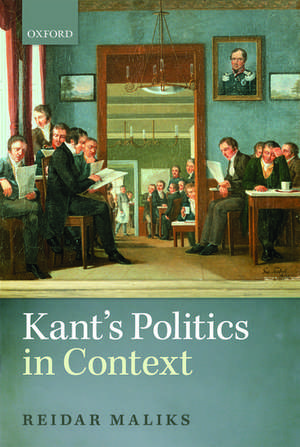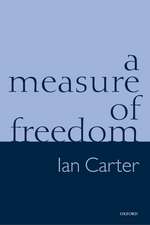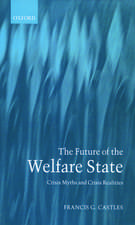Kant's Politics in Context
Autor Reidar Maliksen Limba Engleză Hardback – 11 sep 2014
| Toate formatele și edițiile | Preț | Express |
|---|---|---|
| Paperback (1) | 261.64 lei 31-38 zile | |
| OUP OXFORD – 14 dec 2017 | 261.64 lei 31-38 zile | |
| Hardback (1) | 641.34 lei 31-38 zile | |
| OUP OXFORD – 11 sep 2014 | 641.34 lei 31-38 zile |
Preț: 641.34 lei
Preț vechi: 858.02 lei
-25% Nou
Puncte Express: 962
Preț estimativ în valută:
122.72€ • 128.13$ • 101.57£
122.72€ • 128.13$ • 101.57£
Carte tipărită la comandă
Livrare economică 24-31 martie
Preluare comenzi: 021 569.72.76
Specificații
ISBN-13: 9780199645152
ISBN-10: 0199645159
Pagini: 208
Dimensiuni: 163 x 240 x 20 mm
Greutate: 0.47 kg
Editura: OUP OXFORD
Colecția OUP Oxford
Locul publicării:Oxford, United Kingdom
ISBN-10: 0199645159
Pagini: 208
Dimensiuni: 163 x 240 x 20 mm
Greutate: 0.47 kg
Editura: OUP OXFORD
Colecția OUP Oxford
Locul publicării:Oxford, United Kingdom
Recenzii
The book is well-written and the arguments are well-established. I highly recommend the book for anyone who is interested in Kant's moral and political philosophy.
The book nicely illuminates Kants political philosophy in its socio-historical context... The book is well-written and the arguments are well-established. I highly recommend the book for anyone who is interested in Kants moral and political philosophy.
In Kants Politics in Context, Reidar Maliks convincingly sketches how Kants theorizing responded not only to the French Revolutions often harrowing consequences but also to friends and foes who sought to use Kants philosophy to make sense of those events...Both goals are admirably met, and the result is a lively image of Kant among his contemporaries during an extremely rich period of political philosophizing.
This book situates Kants political writings in relation to the sociopolitical context of his day. As such, it is an important contribution to the literature on Kants political philosophy...This is an excellent book and should be read by anyone with an interest in Kant or enlightenment political philosophy.
This is scholarship at a very high level. Scrupulously well argued and rigorously structured, Maliks's book offers some fascinating insights into Kant's political philosophy and his times.
Kant's Politics in Context is a remarkable piece of scholarship. Unusually, it will make for stimulating reading for Kant scholars--who have much to gain from Maliks's contextualist approach--as well as serving as a clear introduction to Kant's political theory. ...we can be thankful to Reidar Maliks for restoring to full view the teleology of a human being urgently and consummately engaged with the political issues of his day.
Maliks' groundbreaking study shows that Kant's solutions appear much less mysterious once the development in Kant's thought is connected to the contemporaneous debates on the political implications of his philosophy
Reidar Maliks' Kant's Politics in Context is a much needed addition to the literature on Kant's legal and political philosophy. ...Maliks throws considerable light onto the development of Kant's legal and political thought and provides an invaluable picture of the German public sphere during that time. ...It is a significant contribution to recent Kant scholarship and, last but not least, a fascinating read
it is beyond doubt that Maliks' argument succeeds in revealing the significance of Kant's distinctive philosophy of politics and law in the face of alternative political-legal visions found in that period of European intellectual history.
I strongly recommend Kants Politics in Context. I learned much from it, and so should anyone interested in Kants intellectual context, the development of Kants political philosophy, the early appropriations of Kants ethics for political purposes or the reception of Theory and Practice.
Maliks not only succeeds in bringing these contexts to life, but he also contributes to a more profound systematic understanding of Kants political philosophy." "In sum, this is an excellent book and a very good read. It would be desirable if more followed the methodology of contextualism as it is applied in this book.
this is a very fine book. It greatly enriches our understanding of the development of Kants political thinking in the 1790s, and provides an excellent (and in anglophone scholarship long overdue)introduction into the broader political debates in the German public sphere in the post-revolutionary period.
What is so striking when reading about Kant's politics in Maliks' book about him is how modern he was, and how this most German of thinkers departed from the stereotype of the teutonic Meisterdenker, and instead came close to the ideal of the British constitutionalist.
The translation of Kants ideas into more recognisable and accessible terminology from the perspective of a modern reader is an incredibly useful reading tool, particularly for readers who may be less familiar with, or completely new to, Kants writing.
Kant thought of philosophy, including political philosophy, as an a priori discipline. As such, his work might be expected to be resistant or even hostile to any sort of contextualization. In this excellent book, Reidar Maliks explores Kant's relation to the events of his era and the political debates of his contemporaries, but does so without dismissing or compromising his philosophical ambitions. It will be essential reading for both Kant scholars and anyone interested in the history of political thought.
By meticulously reconstructing the lively debates between Kant and his many interlocutors, including both his radical and conservative followers, Reidar Maliks illuminates the revolutionary circumstances that shaped Kant's political thought. Maliks' incisive philosophical analysis of Kant on freedom, equality, citizenship, resistance, and peace elucidates German Enlightenment republican thought on its own terms and yet, precisely in doing so, demonstrates its resonances with contemporary political dilemmas.
That Immanuel Kant idealized the public sphere in a time in which the public sphere was still more an ideal than an actually reality is well known. Less well known is that he intentionally developed his own philosophy in public discourse. This is one of the insights of Reidar Maliks' book, a welcome contribution in the knowledge of a philosopher whose ideas shaped so deeply the way the moderns came to conceive of politics as a discursive practice in the open that relies on information and citizens' judgment. Maliks' is a must-read book.'
In the past decades, political philosophy has recovered the systematic appeal of Kant's legal and political thought, but often at the cost of separating it from its origins in the late Enlightenment debates on liberty and paternalism, on republicanism and autocracy, on peace, revolution, and war. Reidar Maliks identifies Kants important precursors in theories of sovereignty and natural law, but also introduces his lesser known interlocutors, conservative or radical, in Europe's revolutionary debates. Maliks offers the first comprehensive English-language contextual reading of Kant's political thought, embedding Kant into the discussions of his age, yet never losing sight of the conceptual standards of todays philosophical debate.
an excellent, well-written, precise and enjoyable book
The book nicely illuminates Kants political philosophy in its socio-historical context... The book is well-written and the arguments are well-established. I highly recommend the book for anyone who is interested in Kants moral and political philosophy.
In Kants Politics in Context, Reidar Maliks convincingly sketches how Kants theorizing responded not only to the French Revolutions often harrowing consequences but also to friends and foes who sought to use Kants philosophy to make sense of those events...Both goals are admirably met, and the result is a lively image of Kant among his contemporaries during an extremely rich period of political philosophizing.
This book situates Kants political writings in relation to the sociopolitical context of his day. As such, it is an important contribution to the literature on Kants political philosophy...This is an excellent book and should be read by anyone with an interest in Kant or enlightenment political philosophy.
This is scholarship at a very high level. Scrupulously well argued and rigorously structured, Maliks's book offers some fascinating insights into Kant's political philosophy and his times.
Kant's Politics in Context is a remarkable piece of scholarship. Unusually, it will make for stimulating reading for Kant scholars--who have much to gain from Maliks's contextualist approach--as well as serving as a clear introduction to Kant's political theory. ...we can be thankful to Reidar Maliks for restoring to full view the teleology of a human being urgently and consummately engaged with the political issues of his day.
Maliks' groundbreaking study shows that Kant's solutions appear much less mysterious once the development in Kant's thought is connected to the contemporaneous debates on the political implications of his philosophy
Reidar Maliks' Kant's Politics in Context is a much needed addition to the literature on Kant's legal and political philosophy. ...Maliks throws considerable light onto the development of Kant's legal and political thought and provides an invaluable picture of the German public sphere during that time. ...It is a significant contribution to recent Kant scholarship and, last but not least, a fascinating read
it is beyond doubt that Maliks' argument succeeds in revealing the significance of Kant's distinctive philosophy of politics and law in the face of alternative political-legal visions found in that period of European intellectual history.
I strongly recommend Kants Politics in Context. I learned much from it, and so should anyone interested in Kants intellectual context, the development of Kants political philosophy, the early appropriations of Kants ethics for political purposes or the reception of Theory and Practice.
Maliks not only succeeds in bringing these contexts to life, but he also contributes to a more profound systematic understanding of Kants political philosophy." "In sum, this is an excellent book and a very good read. It would be desirable if more followed the methodology of contextualism as it is applied in this book.
this is a very fine book. It greatly enriches our understanding of the development of Kants political thinking in the 1790s, and provides an excellent (and in anglophone scholarship long overdue)introduction into the broader political debates in the German public sphere in the post-revolutionary period.
What is so striking when reading about Kant's politics in Maliks' book about him is how modern he was, and how this most German of thinkers departed from the stereotype of the teutonic Meisterdenker, and instead came close to the ideal of the British constitutionalist.
The translation of Kants ideas into more recognisable and accessible terminology from the perspective of a modern reader is an incredibly useful reading tool, particularly for readers who may be less familiar with, or completely new to, Kants writing.
Kant thought of philosophy, including political philosophy, as an a priori discipline. As such, his work might be expected to be resistant or even hostile to any sort of contextualization. In this excellent book, Reidar Maliks explores Kant's relation to the events of his era and the political debates of his contemporaries, but does so without dismissing or compromising his philosophical ambitions. It will be essential reading for both Kant scholars and anyone interested in the history of political thought.
By meticulously reconstructing the lively debates between Kant and his many interlocutors, including both his radical and conservative followers, Reidar Maliks illuminates the revolutionary circumstances that shaped Kant's political thought. Maliks' incisive philosophical analysis of Kant on freedom, equality, citizenship, resistance, and peace elucidates German Enlightenment republican thought on its own terms and yet, precisely in doing so, demonstrates its resonances with contemporary political dilemmas.
That Immanuel Kant idealized the public sphere in a time in which the public sphere was still more an ideal than an actually reality is well known. Less well known is that he intentionally developed his own philosophy in public discourse. This is one of the insights of Reidar Maliks' book, a welcome contribution in the knowledge of a philosopher whose ideas shaped so deeply the way the moderns came to conceive of politics as a discursive practice in the open that relies on information and citizens' judgment. Maliks' is a must-read book.'
In the past decades, political philosophy has recovered the systematic appeal of Kant's legal and political thought, but often at the cost of separating it from its origins in the late Enlightenment debates on liberty and paternalism, on republicanism and autocracy, on peace, revolution, and war. Reidar Maliks identifies Kants important precursors in theories of sovereignty and natural law, but also introduces his lesser known interlocutors, conservative or radical, in Europe's revolutionary debates. Maliks offers the first comprehensive English-language contextual reading of Kant's political thought, embedding Kant into the discussions of his age, yet never losing sight of the conceptual standards of todays philosophical debate.
an excellent, well-written, precise and enjoyable book
Notă biografică
Reidar Maliks' articles have appeared in journals including Kantian Review and History of Political Thought and he is the co-editor of Kantian Theory and Human Rights. Reidar Maliks is an associate professor of philosophy at the University of Oslo
















